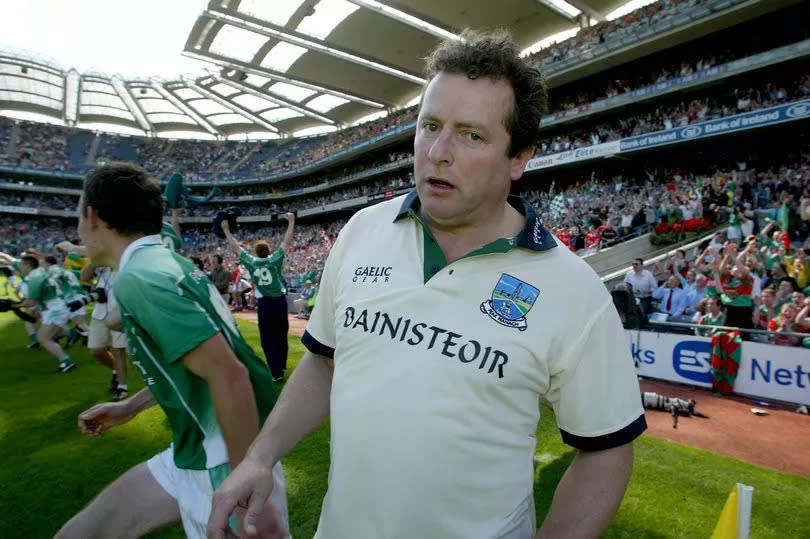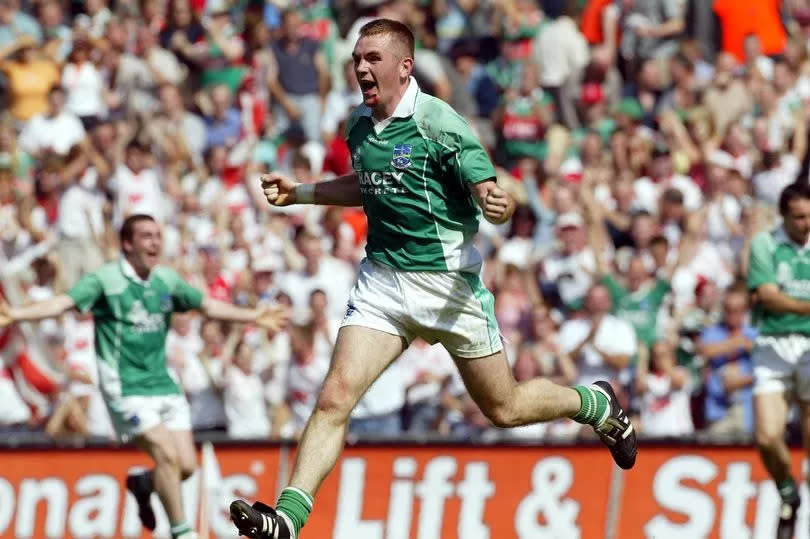Charlie Mulgrew on Fermanagh 2004 odyssey, beating his own, Bloody Sunday and taxis
Charlie Mulgrew is enjoying a “stress free” life, tipping around Letterkenny in his taxi. “Letterkenny is a super place, it really is,” he says.
He spent 30 years as a sales rep for Bass Ireland before retiring. Over the past five years his brown Peugeot Rifter is a familiar sight around the streets of Donegal’s biggest town.
It’s an exciting time to be out and about in the county, with the senior side on the crest of a wave again. Drive across the border from Strabane into Lifford and there greeting you on the side of the road is a lifesize cardboard cutout of Jim McGuinness. The green and gold flags are everywhere.
Read more: All-Ireland SFC permutations: What each Ulster county needs to progress this weekend
But for Mulgrew - an All-Ireland winner with Donegal in 1992 and former teammate of McGuinness - the buzz isn’t quite what it once was.
That’s probably natural enough. Decades of coaching, including four years as Fermanagh boss, have shaped how he views the game.
“I take enjoyment out of it,” says Mulgrew. “(I’m) too analytical I suppose. That’s my problem, looking at what’s this and what’s that.
“But you can reflect on the joy of everybody else. When people get into your taxi and they are all chatting to you about Donegal.
“Because you were part of Donegal for a while, you take a wee bit of buzz out of that. Now you are like an antique at this stage. Most of the people don’t know who you are.
“Maybe a few people from Fermanagh might get in the taxi and talk about that. It is nice, I suppose. If there were elections up, it’s not football chat. It changes.
“But you just had to learn. I wouldn’t have been a follower of the Premiership and stuff like that, but if you were a sales rep you just had to know, if you wanted to have any small talk with anybody.
“Same with the taxiing now, it’s easy conversation: ‘Who do you support?’ The last thing you want to be chatting about is football, if you are involved.”
Mulgrew describes his life now as “worlds apart” to when he was an inter-county football manager.
His old side, Fermanagh play in the Tailteann Cup quarter-final this weekend. 20 years ago Mulgrew was at the helm, in his first Championship campaign with the Erne men.

The year before Fermanagh had got to the All-Ireland quarter-final after turning over Meath and Mayo along the way, but were crushed at Croke Park by a Tyrone side on a mission - 1-21 to 0-5.
Mulgrew was down eight starters from ‘03, a few of them off season “casualties” he reckons prompted by drawing Tyrone in Ulster the following year.
They would run Tyrone to four points. An internal row in Tipperary saw the Premier men forfeit their first round qualifier. That was Fermanagh’s first break.
Then they went on an astonishing run that would see them take down some of the giants of the game in Meath, Cork, Donegal and Armagh.
Sensationally, Mayo were brought to a replay in the All-Ireland semi-final, before Fermanagh lost out by two points.
You can imagine what the only county without an Ulster title would have been like in the build-up to an All-Ireland final with Kerry. It’s difficult to fathom now, two decades on, that it could easily have happened.
Fermanagh official Tommy Curry had been instrumental in bringing Mulgrew in to replace Dom Corrigan: “I remember all my time in Fermanagh very favourably,” he says.
“You were getting fresh lads in, no experience. In ways that can be more beneficial - if they are good lads.
“You don’t have to change much to get them going in a different direction and persuade them to take it. Whereas, if you have older experienced fellas, you have to change the mindset.
“Apart from being very good footballers, nearly all of them were top people.
“Honesty, work rate, support one another, support the management team. It wasn’t too hard to convince them to do what you wanted them to do. They would buy into it quite easily.
“There was a good bunch of leaders. Shane McDermott, Barry Owens. Big Liam McBarron in the middle of the field. You dropped him, he understood it. You brought him on, he understood it. Everyone bought into the unity of the team.
“So easy to deal with. They all believed they were part of it, no matter if they were number one or number 40. Every man felt he was making a contribution and all playing a role in making the team as good as it could be.”
The qualifier victory over Donegal was a particularly difficult afternoon for Mulgrew.

“It was a tight game,” he says. “I went into the Donegal dressing room afterwards and sat down.
“I was nearly there before most of the boys came in. I didn’t know what to do - to smile, or cry, or laugh. I’d have known boys like Brian Roper and Adrian Sweeney.
“I’d have been part of bringing them boys into the Donegal team a few years before it. There was a wee bond with them.
“You kind of thought, ‘What are you at here?’ I wanted to see a couple of the boys. I can’t explain it. I don’t know what it was. Brian McEniff was the manager and I’d have known him for 100 years.
“In the build up you are just doing your job, going out to win a game. When it’s finished, Donegal are out and you are part of the team that put them out.
“To see the faces of these lads that you’d suffered lows and had highs with. You came home after and it struck hard.”
Mulgrew still has thoughts over a few changes he might have made against Mayo, but didn’t.
He also recalls sitting down five days after the Armagh victory at Croke Park to watch what was one of the most seismic shocks in the modern era.
“I was looking at it, saying, f*****g hell, look at them boys playing. I just didn’t believe it. Maybe you watch it on the telly and you are saying Jesus, how well they played and how good they were. It was amazing. I was kind of shocked watching it.
“We had to pull them together at half-time against Armagh and make sure we got them convinced that we can do this job. Put it in their heads. It’s up to you, the guys, to go out and do it.”
It took Mayo two goes to beat them.
“We had our fair share of luck to get there, but again it was there to be won,” recalls Mulgrew. “I still think I could have made a change here or a change there, possibly that might have tipped it.
“Possibly, I was a wee bit scared to make a change. I could have made a change that messed it up completely.
“Sometimes you have to be brave and maybe that day I could have been a bit braver, but that’s simply because we lost. One of those things, should I have done this….
“That’s the game. Damned if you do, damned if you don’t.”
Mulgrew moved to Letterkenny as a 12 year old and the town has been home for over 50 years. He is married to Ursula and has two sons, Oisin and Darragh.
He is half Tyrone with his father coming from Ballygawley. He spent the first three years of his life in Dungannon and the next nine in Maghery, just across the border in Armagh.
Then the family upped sticks for a new life in Letterkenny, where Mulgrew won All-Ireland schools titles with St. Eunan’s in football (B title) and soccer in the same year.
The 1982 All-Ireland under-21 winner with Donegal also played rugby locally and had a spell with City of Derry in the All-Ireland League (AIL).
It was an upbringing a lot further away than the 72 miles on the map to Maghery. They left because the family hotel was blown up.
“My da just wanted to get out of there,” says Mulgrew. “It was a bad place, ‘73 in the north of Ireland. It wasn’t a good spot at that stage with a young family growing up. If you stayed, god knows where you would have ended up.
“I remember the helicopters landing in the car park outside the hotel and all the soldiers jumping out.
“I remember after Bloody Sunday, there used to be a wee ferry down the River Blackwater where it drained into Lough Neagh that took you from the Armagh side over to Derrylaughan (Tyrone).
“The soldiers were parked on the other side of the river. There was us young guys, 12 years of age, throwing stones. They weren’t even getting across the river.
“It was a huge move for my father. He was a Tyrone man through and through.”
Mulgrew went to New York in 1983 “a crazy place, all right for a party,” - but more of a homebird, he returned after a year and a half.
“You wouldn’t say the football was tougher than home.” he says. “It was just dirtier. “Dirty, ignorant gits playing silly, hitting a box from behind. Stuff like that.
“I remember one game playing for Tyrone in Boston where if you were a Tyrone player running up and down the line, the Leitrim manager would be whacking you.
“And if you were a Leitrim player running up the field the Tyrone manager would be whacking you. It was pure madness. It was more of a fight than a game.”
It’s a quieter life now, away from the madness and stress of the football field- - playing and managing - and all that went with that.
Managing is “wondeful, once you get into it,” he says, “but it never stops.”
“Fermanagh is 20 years ago now," he says. "Worlds apart. 20 years ages everybody.”
“It’s a stress free life, the taxiing. Five years now, just doing the days - Monday to Friday."
Sign up to our free sports newsletter to get the latest headlines to your inbox.

 Yahoo News
Yahoo News 
